| Manufacturer: | Centuri |

(Contributed - by Bob Hvarven)
Brief:
The Maurader is a two-stage rocket originally designed to fly on 18mm motors. I
upscaled it to accomodate 24mm "D" engines.
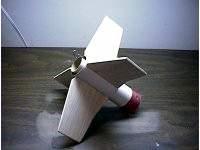
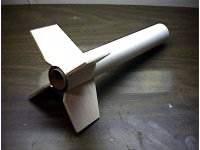
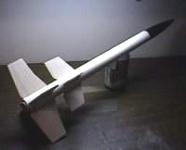
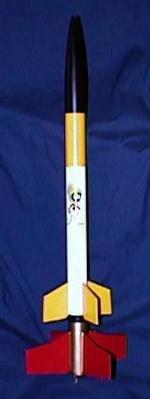 Construction:
Construction:
The instructions consisted of some assembly sheets downloaded from JimZ. The
plan was easy to follow and the assembly order was ok. The rocket is easy to
build if you have ever built from scratch before and shouldn't cause too much
pain to the first time scratchbuilder. Fin alignment is critical on any rocket
and this one is a little bit harder due to the 8 fins having to align on both
booster and sustainer. this rocket is of sturdy design, and should survive most
recoveries. No special tools needed, and the supplies came from my bag of
tubes, pile of balsa, and an old PNC-56 I had laying around. I made mine an
upscale to accomodate "D" engines instead of "C's" :), and
added 3/8" to the dimensions of the fin templates. Used BT56 tubes and
appropriate couplers.
Finishing:
Normal finishing techniques were employed, with sealing of fin material with
Dope Sanding Sealer, sanding, and painting with Krylon paints; White, Red,
Black, and gold. I think the model has a very nice look, and brought back
memories of the "Good Ol' Day's" when you had to BUILD everything. I
have found myself building more, and more of the OOP models lately and really
enjoy it. I will send the dimensions (tubes length, etc.)used if you send
E-Mail request for them to bobcat2@alaweb.com
Construction Rating: 4 out of 5
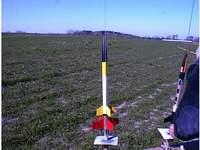 Flight:
Flight:
I used Estes D12-0 for the booster and the D12-7 for the sustainer. Preparation
was normal with engine being put in booster and sustainer with standard Estes
motor clips for retention. Wadding was the celulos insulation material used in
the sustainer. The flight was great with a straight climb and separation of the
booster and subsequent ignition of the sustainer. This rocket puts the
sustainer a long way up, and is not a small field rocket. The recovery of the
booster is by tumble method and it came down very gently without any damage.
The sustainer was on an 18" Estes chute suspended from aprox. 6 ft. of
1/8" elastic shock cord. All was recovered in perfect condition.
Recovery:
Recovery was without incident. The only negative I noticed was that the area
where the booster and sustainer join, had a lot of residue from the ejection
charge. The area caused it to go together very tightly. I feel that after a few
flights more the area will not go together, and it may turn into a single stage
rocket. I see no way to prevent this from being a problem. I will probably
launch it a few more times, and make it a static display of "How we used
to do it"..
Flight Rating: 3 out of 5
Summary:
Main Pro's - Fun to build, nostalgic, good looking, semi-complex, sturdy
design. Main Con - Coupler area getting dirty, and not going together after a
realitively few flights.
Overall Rating: 4 out of 5
Sponsored Ads
 |
 |











